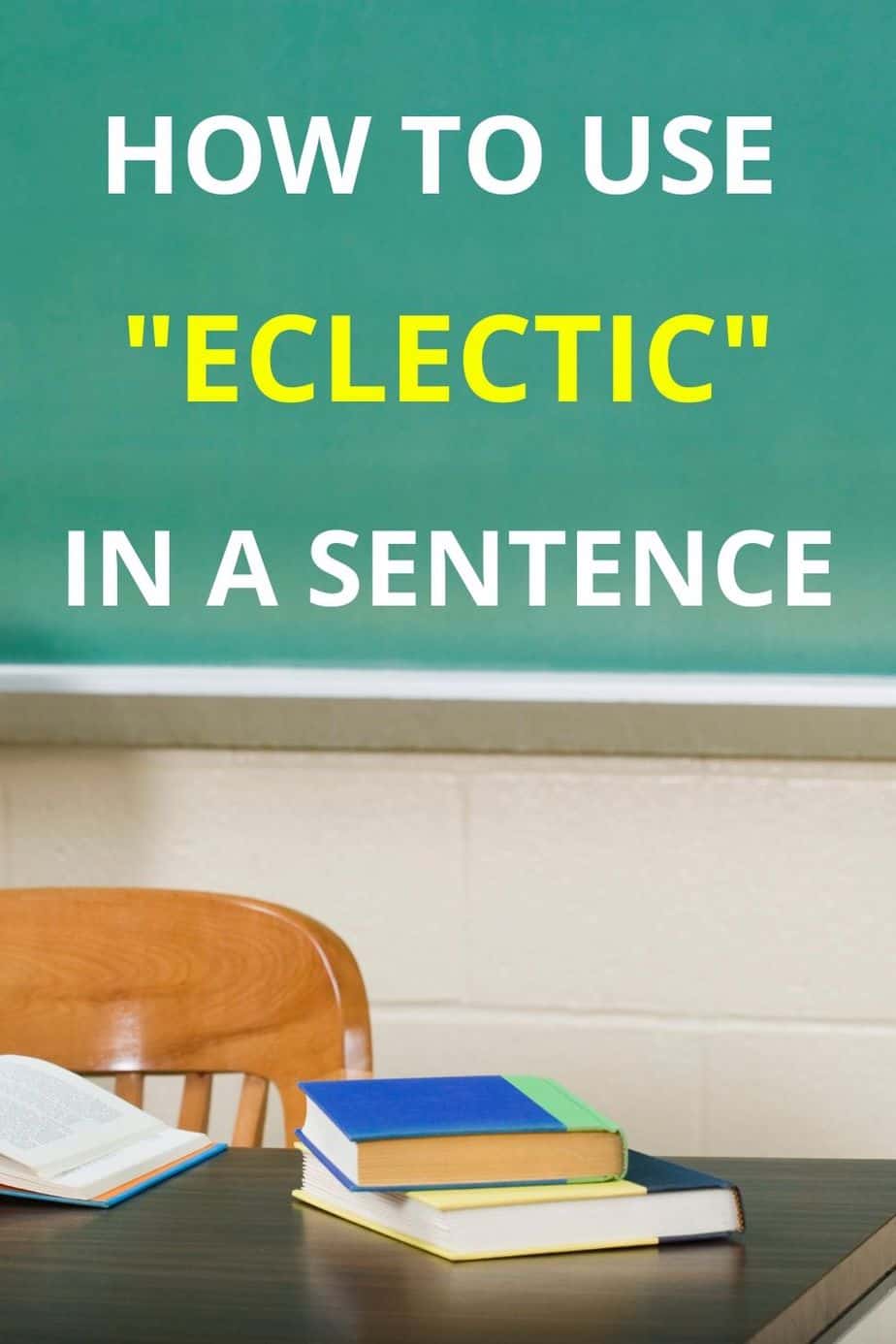The English language pulls words from all over the place.
In that sense, it’s a lot like today’s word: eclectic.
How do you use “eclectic” in a sentence?
The word “eclectic” is an adjective meaning that something such as a book, system or method combines practices or theories from different religions, philosophies, systems or backgrounds instead of just one. When used to refer to a person, “eclectic” means that someone gets their own ideas from various places. To use “eclectic” in a sentence, simply place it before the noun to which it refers or use it to describe something as eclectic.
Examples
All these examples show “eclectic” as an adjective, used to show the variety found in the noun it describes.

The meaning of “eclectic”
Eclectic is an adjective, meaning it’s a word used to describe a person, place or thing. Eclectic isn’t really used to describe places very often, so let’s focus on what this word means with people and things.
When used to describe a person, the word “eclectic” means that person’s habits or ideas come from many different backgrounds. If an artist has stylistic influences including Pablo Picasso, Leonardo da Vinci and Jackson Pollock, that artist is pretty eclectic.
So far as things go, the word “eclectic” is usually only applied to abstract concepts like philosophies or work habits. The meaning is the same: something that’s eclectic draws its inspirations from all over.
With that being said, you can certainly apply “eclectic” to specific things. In this case, it usually means the ideas used to create that object were eclectic, rather than the item itself.
If someone were to describe a lunch as eclectic, for instance, they might mean that it was inspired by cuisines from around the world all mixed in unusual ways.
More rarely, “eclectic” can be a noun used to describe a person. The meaning here is similar to when the adjective is used to describe a person, but if you are using a noun you are making a much stronger statement about all that person’s habits and ideas, rather than just some.
Where “eclectic” comes from
Word etymologies are sometimes obscure, but the origin of “eclectic” is very straightforward.
It comes directly from Greek “eclectikos,” meaning “selective.” In fact, the word has its origin in the name for a specific school of Classical Greek philosophy.
In Classical Greece, philosophy was huge. Students flocked to hear people like Aristotle and Plato hold forth, and in many cases these famous philosophers held a role that was part educator, part orator and part popular figure.
If it helps, you can think of them as the YouTube stars of Classical Greece, except instead of unboxing videos they shared insights into the very nature of existence.
Most of these philosophical schools traced their teachings from one specific figure, such as Aristotle or Pythagoras.
Others picked ideas from various other schools to create a diverse set of ideas and a philosophical with no single origin. These philosophers, which included the famous orator Cicero and the historian Seneca the Younger, were deemed Eclectics.
The word itself wasn’t used too frequently in Classical Greece, and when it was used it wasn’t really a compliment. Over time, however, the word lost any negative meanings it had.
Today, being eclectic doesn’t imply either a good or a bad habit. All it means is that someone or something pulls ideas from multiple places.
How to use “eclectic” in a sentence: In-depth analysis
Using the word “eclectic” in a sentence is straightforward. If “eclectic” is an adjective, you can use it by placing it in front of any noun. You can also use the adjective by itself by saying something “is eclectic.” Also, eclectic can be used as a noun. In this case, it refers to a person who has eclectic habits.
How to use the noun “eclectic” in a sentence?
If you’re using “eclectic” as a noun, then you need to include the indefinite article, “an,” in front of it. Otherwise, you will be able to use it just like any other noun. Note that whether “an” precedes “eclectic” is not a good indicator by itself of whether the word is an adjective of a noun. The bottom line is that if “eclectic” is not describing another noun in the sentence, it’s a noun.
Example

Hey fellow Linguaholics! It’s me, Marcel. I am the proud owner of linguaholic.com. Languages have always been my passion and I have studied Linguistics, Computational Linguistics and Sinology at the University of Zurich. It is my utmost pleasure to share with all of you guys what I know about languages and linguistics in general.

